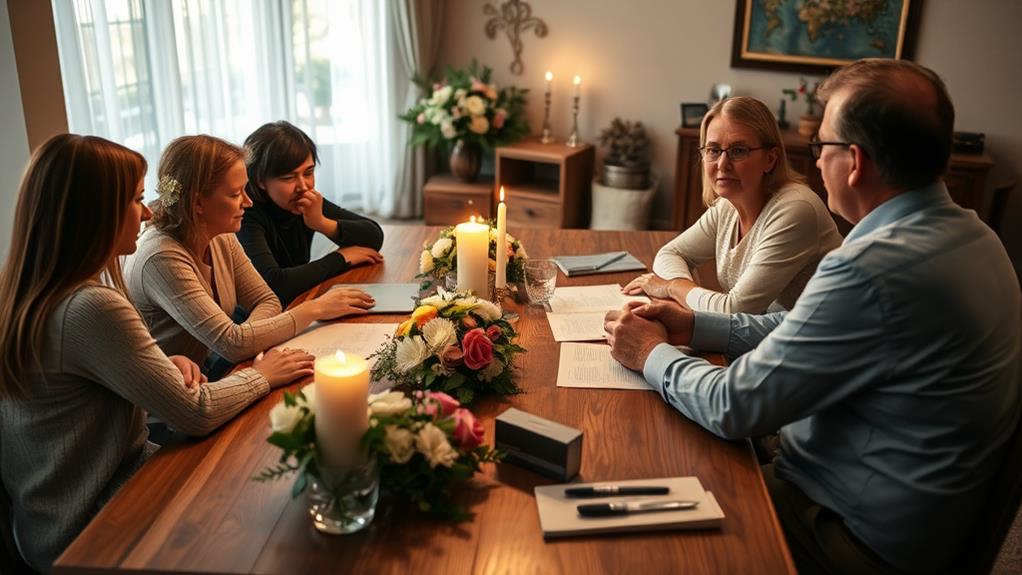In the difficult moments following a death, first, notify close family and friends with compassionate and empathetic language. Then, contact medical professionals to verify the cause of death and obtain a death certificate. Next, inform relevant authorities to comply with legal requirements. Secure the deceased's property by documenting and safeguarding valuables. Begin making funeral arrangements by considering the deceased's preferences and consulting a funeral home. Finally, seek emotional support through grief counseling or support groups. By taking these steps, you'll find guidance in handling this challenging time and can discover more important details next.
Notify Close Family and Friends

Facing the loss of a loved one is incredibly difficult, but notifying close family and friends is a necessary step. It's important to approach this task with empathy and clear communication strategies.
Begin by identifying the immediate family and closest friends who need to be informed first. Consider the emotional impact and offer grief support during your conversations.
When making these calls, speak gently and directly. Use clear, compassionate language to convey the news. You might say, "I have some very sad news. [Loved one's name] has passed away." Allow the person time to process the information and be prepared to offer emotional support. It's okay to share your own feelings of grief; it can help create a supportive environment.
If the task feels overwhelming, enlist the help of other family members or close friends. They can assist in spreading the word and providing additional support.
Utilizing group communication strategies, like phone chains or messaging groups, can guarantee everyone is informed timely and consistently. Remember, your goal is to provide comfort and understanding, fostering a network of grief support for everyone affected.
Contact Medical Professionals
After notifying close family and friends, you should promptly contact medical professionals to verify the cause of death.
This step is essential for obtaining the death certificate, which you'll need for various legal and administrative processes.
Confirm you notify the authorities as soon as possible to comply with legal requirements and begin the necessary procedures.
Verify Cause of Death
When a loved one passes away, how do you guarantee that the cause of death is accurately determined? The first step is to contact medical professionals promptly. They play an important role in cause confirmation and making sure all details are accurately recorded.
If your loved one passed away in a healthcare facility, the attending physician will typically handle this. They'll examine medical records and conduct any necessary examinations to determine the cause of death.
In cases where the death occurred at home or under uncertain circumstances, you should contact emergency services or the deceased's primary care physician immediately. They'll guide you through the process and, if necessary, arrange for a medical examiner or coroner to perform an autopsy. This step is essential for a precise cause confirmation, especially if there are any legal or insurance-related concerns.
Throughout this process, be sure to gather all relevant medical records and documentation. These records will provide significant information to the medical professionals and make sure that the cause of death is determined accurately.
Obtain Death Certificate
Securing a death certificate is a significant step following the passing of a loved one. This document is essential for many legal and administrative processes, so it's important to obtain it promptly.
To start the death certificate process, you'll need to contact the medical professional who confirmed the death, whether that's a doctor, a hospice nurse, or the hospital staff. They'll provide the necessary medical details required for the certificate.
The death certificate includes important information such as the cause, location, and time of death. Ensuring these details are accurately recorded is imperative, as errors can complicate future legal requirements.
Once the medical professional completes their portion, the certificate will typically be forwarded to the local essential records office.
You may need multiple copies of the death certificate for various legal matters, such as settling the deceased's estate, closing bank accounts, and claiming insurance benefits. It's often useful to request several certified copies to streamline these processes.
While this may feel overwhelming, remember you're not alone. Medical professionals and local authorities are there to guide you through the death certificate process, making sure you meet all legal requirements efficiently.
Notify Authorities Promptly
Once you've obtained the death certificate, your next step is to notify the appropriate authorities promptly. This is a significant part of fulfilling your legal obligations and guaranteeing that all necessary procedures are followed.
Contacting medical professionals is often your first move. They can guide you through the death notification process and offer support.
Here's what you should do:
- Contact the deceased's primary care physician: They can provide essential information and help complete any required documentation.
- Notify the local health department: This is often a legal requirement and guarantees that the death is officially recorded.
- Reach out to the coroner or medical examiner: In certain situations, especially unexpected deaths, their involvement may be necessary to determine the cause of death.
These steps are critical for a smooth progression and to meet legal obligations. By promptly notifying the appropriate authorities, you guarantee that all necessary documentation is in order and that the deceased is treated with the utmost respect.
Inform Relevant Authorities

After experiencing the loss of a loved one, one of the vital steps you'll need to take is informing the relevant authorities. It's a challenging time, but understanding the legal requirements and reporting procedures can help you navigate this process more smoothly.
First, if your loved one passed away at home, call emergency services or the local police. They need to verify the death and may arrange for a coroner or medical examiner if required. Additionally, you might want to reach out for grief support and guidance during these trying times.
Next, you should notify the deceased's primary healthcare provider. They can provide necessary medical documentation, such as a death certificate, which is essential for legal purposes. If your loved one was in a hospital or nursing home, the staff will usually handle these initial notifications.
You'll also need to contact social services and any relevant governmental bodies, depending on your location, to officially report the death. This may include notifying the Social Security Administration if you're in the United States.
Remember, each jurisdiction has specific reporting procedures, so it's important to follow local guidelines.
Though this process can be overwhelming, being diligent in informing the relevant authorities guarantees that your loved one's legal matters are handled properly and with respect.
Secure the Deceased's Property
The cherished possessions of your loved one hold not just monetary value but also sentimental significance. To guarantee nothing is lost or damaged, securing their property should be a priority. Start by creating a detailed property inventory. This will help you keep track of personal belongings and prevent any misunderstandings later.
As you go through their home or living space, consider these steps:
- Document Everything: Write down or photograph each item. This includes furniture, jewelry, electronics, and important documents.
- Secure Valuables: Place valuable items in a safe or another secure location. You might also consider transferring them to a trusted family member or friend. Consideration of arrangement size and space is also vital when deciding where to store these valuables.
- Notify Utilities and Services: Inform service providers to prevent unnecessary charges and guarantee the property remains secure.
While this process can be emotionally challenging, it's essential for protecting your loved one's legacy and guaranteeing their wishes are honored.
Remember, you don't have to do it all alone. Enlist the help of family members or close friends who can provide both emotional and practical support.
Begin Funeral Arrangements

Securing your loved one's property is a significant step, but equally important is the task of organizing their final farewell. Begin by considering their funeral preferences. Did they express a desire for a traditional ceremony, a celebration of life, or perhaps something more unique?
Look for any written instructions they may have left, as these can guide you in making decisions that honor their wishes.
Next, explore burial options. Would they prefer cremation or a traditional burial? If opting for a burial, decide on a cemetery and plot. For cremation, you'll need to choose whether to keep the ashes, scatter them, or place them in a columbarium.
Each choice holds its own set of considerations and can be influenced by your loved one's beliefs and values. For those finding it difficult to articulate their emotions, eulogy writing services can assist in crafting a meaningful tribute.
Contact a funeral home to help coordinate the details. They can assist with everything from transporting the body to planning the service.
Make sure to discuss any specific cultural or religious customs that should be observed. Your goal is to create a service that reflects the life and spirit of your loved one, providing comfort to all who attend.
Seek Emotional Support
Coping with the loss of a loved one can be overwhelming, and seeking emotional support during this time is essential for your well-being.
It's common to feel a range of emotions, and reaching out can help you navigate these feelings more effectively. Connecting with others who understand what you're going through can provide comfort and a sense of community.
If you're struggling to articulate your feelings, consider looking into professional services that can help you express your grief through written words, such as heartfelt obituaries and condolence messages.
Consider the following options to support your emotional health:
- Grief counseling: Professional grief counselors are trained to help you process your emotions and develop coping strategies. They can offer a safe space to express your feelings and work through your grief.
- Support groups: Joining a support group allows you to share your experiences with others who are also grieving. These groups provide mutual understanding, encouragement, and a sense of belonging.
- Reach out to friends and family: Lean on your loved ones for support. Sometimes, just talking about your feelings with someone who cares can make a significant difference.
Conclusion
After a death, it's crucial to act promptly and thoughtfully. Notify close family and friends first, then contact medical professionals and relevant authorities. Make sure to secure the deceased's property and start funeral arrangements. Don't forget to seek emotional support—you're not alone in this difficult time. Remember, taking these steps helps you honor your loved one and begin your healing journey. It's a tough process, but you'll get through it with the help of those around you.



